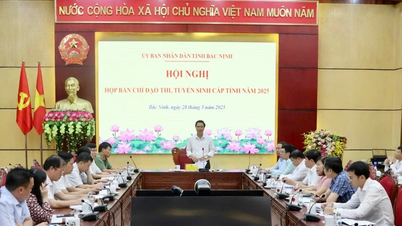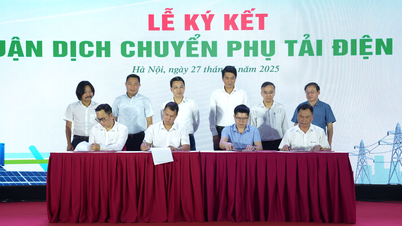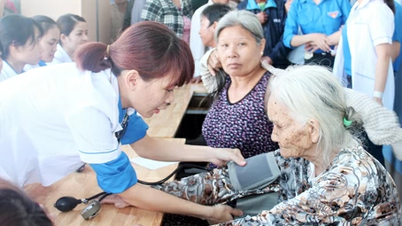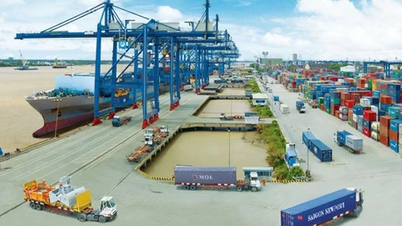Speaking to Thanh Nien , Associate Professor Hoang Minh Son, Deputy Minister of Education and Training, said that according to the new approach, the Regulation on admission and training for doctoral degrees that the Ministry has just issued (Regulation 18) affirms that scientific research is a key and mandatory component in the doctoral training program, requiring doctoral students to spend time focusing on studying, researching and participating in professional activities at the professional unit as an assistant lecturer or permanent researcher of the training institution.
In addition, PhD students must follow the full-course study and research plan approved by the instructor, professional unit and training institution.
Drafted after the implementation of the Law on Higher Education, Regulation 18 promotes academic autonomy and the role of training institutions, especially professional units and the scientific community. This is the core of academic autonomy.
Academic autonomy improves training quality
According to you, besides the innovation of viewpoints and approaches to PhD training in Regulation 18, what factors affect training quality?
The quality of PhD training depends on the capacity and effort of the PhD student, the scientific capacity, the guidance of the supervisor; the learning and research environment and the capacity of the professional unit; the assessment and supervision of the scientific community in the professional field; and especially the process of organizing and managing learning and research.
As a state management agency, the Ministry develops policies to improve the quality of training through a number of legal documents, of which the Regulation on admission and training for PhD level (Regulation 18) is just one of those documents. With Regulation 18, the Ministry focuses on the minimum regulations and requirements for organizing the implementation of training programs, complying with training program standards. Regulation 18 also emphasizes the role and responsibility of scientists in the work of reviewing, evaluating theses and monitoring quality. Furthermore, after completing the defense at the evaluation council, the doctoral student's thesis is also posted on the training institution's electronic information page for scientists to review and evaluate. If necessary, the Ministry performs the function of state management through inspecting the training process and organizing the quality assessment of theses.
Recently, the Ministry also issued Circular 17 regulating training program standards for all levels of universityeducation , setting out minimum requirements for input, output, staff, facilities for training and research, requirements for structure, volume and content of training programs.
On that basis, scientists and experts will participate in industry advisory councils to help the Ministry develop training program standards for training fields and sectors. These may set higher requirements and standards than the general requirements for each level, especially at the PhD level, which is expected to be completed by 2025. The contents specified in the training program standards are the requirements for the quality of PhD training.
It should also be added that while the program standards for each field and training sector have not been issued, Regulation 18 has included the standards for supervisors, requirements, and conditions for PhD students to have their PhD thesis evaluated at specialized units.
 Deputy Minister Hoang Minh Son PHOTO: DAO NGOC THACH |
Is there a boom in doctoral training?
Some scientists are concerned that with the PhD output standards in Regulation 18, PhD training at universities may flourish again and reduce quality. Is this consistent with the spirit of real learning and real exams that the Prime Minister emphasized?
As mentioned above, the quality of PhD training depends on the learning process closely linked to the scientific research of the PhD student, on the objective and impartial assessment of experts, especially the professional unit and the PhD thesis evaluation council.
Fulfilling the responsibility of ensuring academic integrity A new point in Regulation 18 is to focus on requirements on academic integrity for PhD students and their PhD theses. How will these requirements be implemented? Professional ethics in general and academic integrity in particular are requirements for every scientist, not just for PhD students. Recently, it is very encouraging that the Vietnamese scientific community has paid special attention to the topic of professional ethics and academic integrity, especially in international scientific publications. Within the framework of a regulation, only mandatory requirements are set out for training institutions and PhD students to fulfill their responsibility of ensuring academic integrity in the process of studying, researching and publishing research results. At the same time, the regulation also sets out regulations to enhance transparency in the training process and thesis defense so that scientists can participate in supervision. This is also one of the core issues of academic autonomy when professionals perform their roles and responsibilities in developing a research culture, along with the academic spirit, including academic integrity. |
The requirement for scientific publication in the new regulation is not actually lowered, but rather made more reasonable for a legal document that requires wide coverage, ensuring feasibility nationwide (242 university education institutions, 40 PhD training research institutes) and general application to training sectors (24 training fields).
Requiring PhD students to spend time studying, researching and participating in professional activities at a professional unit as an assistant lecturer or doing regular research is a demonstration of the spirit of "real learning".
The input assessment by the admission councils, the periodic progress assessment and thesis assessment at the professional unit, the thesis assessment by independent reviewers, the thesis assessment at the thesis assessment council of the training institution, the assessment and review by the entire scientific community when the thesis is published on the website of the training institution, and the examination are to implement the spirit of "real exam". The examination of the training process and the organization of thesis quality assessment by the Ministry of Education and Training are also measures to implement the spirit of "real exam".
Current statistics show that the scale of PhD training based on the number of lecturers with PhD degrees among fields and training sectors is quite balanced, with the highest levels in mathematics, computer science, natural sciences, engineering and technology. It should be noted that our current scale of PhD training compared to the region and the world is still too low. With the above quality management measures, if implemented seriously, it will be difficult for PhD training to flourish as some scientists worry.
Our current PhD training scale is about 12,000. Meanwhile, lecturers with PhD degrees are 21,000, and those qualified to participate in PhD training are more than 14,000. This number of 14,000 people does not include scientists who both do research and participate in postgraduate training at research institutes.
Source: https://thanhnien.vn/quy-che-dao-tao-tien-si-moi-thuc-thi-tinh-than-thi-that-hoc-that-1851089974.htm


![[Photo] 12th grade students say goodbye at the closing ceremony, preparing to embark on a new journey](https://vphoto.vietnam.vn/thumb/1200x675/vietnam/resource/IMAGE/2025/5/28/42ac3d300d214e7b8db4a03feeed3f6a)
![[Photo] Vietnamese and Hungarian leaders attend the opening of the exhibition by photographer Bozoky Dezso](https://vphoto.vietnam.vn/thumb/1200x675/vietnam/resource/IMAGE/2025/5/28/b478be84f13042aebc74e077c4756e4b)
![[Photo] General Secretary To Lam works with the Central Policy and Strategy Committee](https://vphoto.vietnam.vn/thumb/1200x675/vietnam/resource/IMAGE/2025/5/28/7b31a656d8a148d4b7e7ca66463a6894)
![[Photo] Prime Minister Pham Minh Chinh receives a bipartisan delegation of US House of Representatives](https://vphoto.vietnam.vn/thumb/1200x675/vietnam/resource/IMAGE/2025/5/28/468e61546b664d3f98dc75f6a3c2c880)




















































































Comment (0)